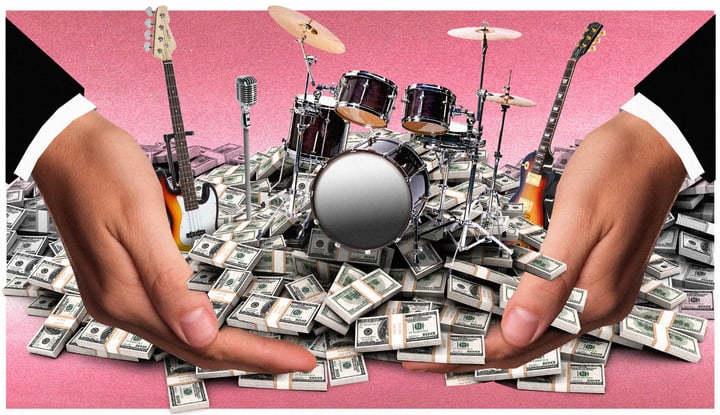The Same Old Tune
John Denver looked a bit lost on the big black stage. "This particular song seems still to be the story of my life in many respects," he said. G major, C major, Denver played the first chords, the light of the spotlight shone brightly on the guitar hanging in front of his chest. "All my bags are packed, I'm ready to go." It was with these lyrics – about pangs of separation experienced by a frequent traveler – that Denver sang himself into the souls of his fans. Today, that live performance of "Leaving on a Jet Plane" has been immortalized on YouTube. It also still gets ample radio play.
It’s one of those songs that you sing loudly in the car on road trips with friends, one that reminds you of your first kiss or your first heartbreak. It's a melody that accompanies you throughout your entire life.
For coolly calculating investors, however, Denver's track is more than just a song that evokes the good times – it’s a solid investment in the future. When someone buys the rights of works by songwriters, composers and publishers, they then pocket the money paid when the music is played on the radio, in the supermarket, in the elevator or as someone's ringtone. The Paradise Papers show that, almost a half-century after its release, Denver's "Leaving on a Jet Plane" alone still brought in more than $80,000 a year.
According to the internal business documents, the investors earned money for years on songs by artists like Denver, Bob Marley and Avril Lavigne. They purchased all or part of the rights to the works, aggregated the songs into a music catalog – and deposited them offshore. Anyone who listened to a song in the catalog on the radio before 2014 unwittingly contributed to the shifting of millions of dollars into tax havens. According to the documents, the music catalog was one of the biggest of its time and included the rights to more than 26,000 songs, including classics like Bob Marley's "Get Up, Stand Up," as well as "Because of You" by Kelly Clarkson and "Last Resort" by Papa Roach. It included works of rock, pop, reggae, jazz and soul, stretching over more than 70 years. At its core are songs by American rock-singer and songwriter Sheryl Crow, including her hit "My Favorite Mistake." Crow's tracks have been part of the music catalog since 2009 – when 153 of her songs changed ownership for about $14 million.
The business documents, which cover a period until 2014, are a testament to an increasingly popular trade among investors. "There is a burgeoning market for music catalogs among institutional investors who are looking for fairly reliable revenues in the future," said Chris Hayes, an economist with the marketing company Ender Analysis. Industry insiders say that a well-managed catalog can be expected to provide 10 to 15 percent returns on investment per year. For some time now, this has attracted not just music publishing companies, but also large-scale investors like investment funds.
The music catalog from the Paradise Papers belonged to an English fund with the cumbersome name First State Media Works Fund 1. The investors included pension funds from Europe, Australia and the United States. It was first managed by a company based in Ireland, then an English music publisher. Starting in 2011, Bertelsmann subsidiary BMG Rights Management controlled the music rights for three years.
Those who invest money in the music market secure rights to songs that have been frequently played for years, or invest in songs they believe will be played often in the future – on the radio, in ads or in movies. The value of a song can go up quickly when, for example, one manages to bring a popular remix onto the market. Or if a song is placed on a successful TV show like "Friends."
One of the best-known music investors was Michael Jackson. He showed his good business sense when he bought a music catalog in 1985 for $47.5 million that included songs by the Beatles, including "Hey Jude" and "Let It Be." At the the time, Jackson outbid Beatles singer and composer Paul McCartney in a spectacular fashion. Last year, Jackson's heirs sold the Beatles songs, along with part of the catalog, to Sony for $750 million.
But a person can make money not just with evergreens, but also songs played year after year on holidays or at celebrations. In 1893, kindergarten teachers Mildred and Patty Hill composed "Good Morning to All" – now known as "Happy Birthday." The song brings in about $2 million annually.
The Paradise Papers also show how much the most valuable songs in the music catalog brought in during 2009, sums that would easily finance a single-family home. The top earner in the catalog was "Disco Inferno," by The Trammps – a big hit in the 1970s, later covered by Tina Turner – that brought in $460,000. In second place was John Denver's "Take Me Home, Country Roads," with $281,000. The song "Paralyzer" by Canadian rock band Finger Eleven brought in $240,000 and came in third. In total, according to the internal listing of the BMG subsidiary revealed in the Paradise Papers, the catalog generated around $4.6 million in revenue per year between 2010 and 2012.
But apparently very few taxes were paid on it.
"We have assumed the tax structure position of the Company as an off-shore tax structure whereby no tax is payable on income generated by the Catalog," KPMG's accountants wrote in 2013 in an asset analysis.
The company managing the fund declined to answer questions about the tax structure. The auditing firm KPMG shared that it did not advise the catalog on issues of taxation, but only conducted an evaluation for the financial report. The company that administered the catalog, BMG Rights Management, wrote that they took over only the management and that it doesn't use tax havens. It also claimed that managing the catalog had never been an "attractive business."
That assessment also seems to jibe with the internal documents in the files. An analysis by auditing firm Pricewaterhouse Coopers showed that the portfolio’s value sank from $153 million to $73 million in 2010 alone. A report from 2013 confirmed the downward trend. According to the internal documents, a New York music publishing house bought all of the catalog's hits one year later for only $38 million – one-quarter of the catalog's value five years earlier.
Aside from the poor efforts to market the catalog, the failure of the investment project was also attributed to the fact that the core of the catalog didn't develop as hoped. The income stemming from Sheryl Crow's songs declined by nearly a quarter. Her new album, "100 Miles from Memphis," it noted, had disappointing sales. One of the reasons according to the analysts: Crow’s genre-shift from rock to country music.

